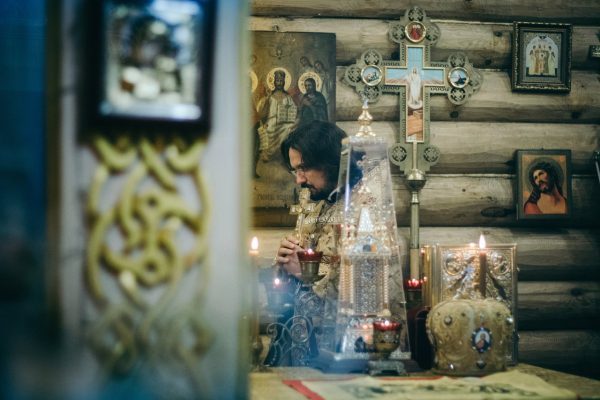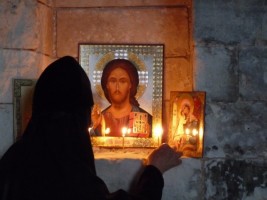The word “gratitude” and the sense of it run through all the Gospels and all the Epistles. When we think of those who wrote these epistles, and the Saints who after them repeated again and again this cry of gratitude to God, we must give thought to the way in which that is possible.
Every one of the Apostles suffered for the privilege, the grace of proclaiming the Gospel. Saint Paul describes what he had to endure in two passages of his Epistles to the Corinthians. There was not one moment in their lives which was not fraught with danger, and heavy with pain and suffering. And yet, at no moment did they hesitate to sing and proclaim their gratitude to God. Why, how could they?
If we think of ourselves — how often do we complain about our lives! And yet, can they be compared at all with the tragic lives of the Apostles or the first generations of Christians? — and indeed, of those who have been confessors of their faith in our century. Surely not! We accuse God of all that is painful, that is bitter, that is lacking in our life. I once had an occasion, at the end of a confession, to say to a person, “I can not give you absolution in God’s Name, because to receive absolution means that you are making your peace with God; and yet, all the confession was an act of accusation — all your sins, all your weaknesses, all that has gone wrong in your life has been His fault; before you receive His forgiveness you must declare that one and for all you forgive Him for the life you have had…”
I think this is something on which we must reflect, because if we only knew what God had done for us — and is doing, day after day — if we only knew our vocation, we would not treat life and God as we do. I remember meeting a priest some years ago in Russia, who had spent twenty years in prison and concentration camp; he sat before me, with luminous, shining eyes, full of wonder and gratitude, and he said. “Do you understand how wonderful God has been to me? How good He has been to me? In those tragic days when a priest was not allowed into a prison or camp, He chose me, an unworthy, inexperienced priest, and He sent me for twenty-six years to prison and to camp to be there as His witness to those people who needed Him most”. That is what he had brought from camp: and infinite gratitude to a God Who had chosen him to be His witness, chosen him to be the man who brings consolation, who gives strength, who allows joy to shine where only darkness could have prevailed…
And we — we live in a world which is not all darkness; even if we think of it as twilight, there is light in it. Each of us has so much — materially, spiritually, emotionally, in all possible ways; and all that is God’s gift. But also, the vocation which we have to go into the world, that is to all the places where our life leads us — our family, our place of work, among our friends — and to bring God into it. Yes — God Himself, His word, His love, His concern, His own attitude to men, women and children.
God became man; but man has abandoned Him, betrayed Him, renounced Him, mocked Him, misunderstood Him. And God came into the world to us, as Saint Paul says, while we were still His enemies in order to make friends of us. That is what we are called to be: those who go into the world, the small world in which we live, and bring to everyone light and peace, and joy and hope.
That can be done only if we learn gratitude, if we learn the wonder which this priest expressed to me: the wonder of being sent into the darkest places of life to bring light, to be sent into the place where there is no hope, to bring unconquerable hope, be sent into the place where there is no love, to bring at least a flicker of love.
If we do this and we see how this message can be received, how people who are in the shadow suddenly see that light does shine in the darkness and that darkness cannot put it out — if we only could see that, we would be prepared to sing to God the hymns of gratitude which we find in the Psalms, in the Prophets, in the Apostles, in the martyrs, in the ascetics — all those who carried a cross so heavy — and did it with gratitude and joy. Amen.




















